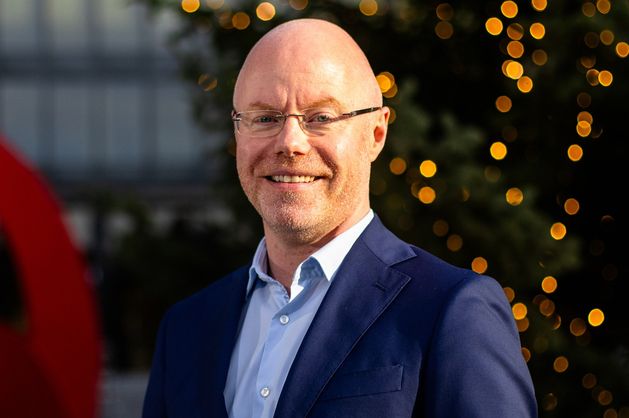[ad_1]
Tánaiste Micheál Martin was interrupted by anti-NATO protesters at the opening of the Consultative Forum on International Security in Cork.
Ireland should not be “squeamish” about becoming more involved in the Permanent European Security Structures (Pesco) or in increasing the State’s capabilities in cybersecurity and in maritime security, Tánaiste Micheál Martin has argued.
It came after the opening session of the Consultative Forum on International Security Policy in UCC was overshadowed by anti-war protesters who unfurled an anti-Nato banner and tried to shout down Mr Martin and also the chair, Professor Louise Richardson, during their opening addresses.
Speaking to reporters at the end of first session, the Tánaiste said that Ireland would remain militarily neutral but that people should not be afraid to talk about increased focus on the State’s security, or greater cooperation with others in relation to new forms of threat.
“The Government is not changing from military neutrality. We said this repeatedly. But you do need to discuss the wider challenges that are coming not just our way but across Europe.
“What I’m doing here is being more transparent about talking about participation in Pesco initiatives, such as maritime surveillance, such as cybersecurity, or indeed airlift. My view is we should be a part of those.
“We’ve been members of Partnership for Peace with Nato since 1999. And I’m simply saying we shouldn’t be squeamish about these issues. We shouldn’t be afraid to even mention our participation in these initiatives.
“There is that tendency in Irish debate – and we saw it, to a degree, in the protests this morning – that you do not even talk about these things. And if you even referenced these things, somehow you’re going off on the desperate journey down to joining Nato. That’s not the case.”
:quality(70)/cloudfront-eu-central-1.images.arcpublishing.com/irishtimes/3U3AMXJM6U55DJF3UJ4EOB2ZDE.jpg)
During heated exchanges with protesters from Connolly Youth Movement at the opening session of the forum, Mr Martin contended that the protesters were not respecting democracy and free speech.
“The most undemocratic thing you can do is to shut down debate and that is what you are doing here this morning. You are behaving in a manner that is intolerant of freedom of speech. That is not what we are going to do today.”
After 10 minutes of disruption – in which the protesters shouted slogans and statements – they were escorted from the hall by gardaí.
Subsequently, a single protester also heckled Prof Richardson during her opening address.
It is understood that the Department of Foreign Affairs had anticipated that such a protest would happen and had protocols in place to allow the disruptions to take place and intervene only after a period of time.
Mr Martin told reporters he believed in free speech and in peaceful protests but said the protesters’ efforts to shut down other people speaking and their efforts to stop it getting off the ground ran counter to that.
“I sometimes think a lot of what gets said at the protests doesn’t tally with the reality of how Irish foreign policy is conducted and has been conducted over decades and over successive years,” he said.
Asked if President Michael D Higgins’ intervention last weekend had been unhelpful in terms of the protests that had taken place, Mr Martin said he has never spoken about the Presidency.
Mr Martin said the future of Ireland’s triple lock mechanics for missions abroad (which does not allow the Defence Forces to deploy overseas without approval from the UN Security Council, the Government and the Oireachtas) would be one of the issues that would be discussed at the forum.
Prof Brigid Laffan, emeritus professor at Robert Schuman Centre for Advanced Studies, told the forum during the first session that Pesco was seen as “bad” in the public mind but it allowed Ireland to participate in initiatives that gave protection to our armed forces.
“It increases their capabilities and creates an (Irish) armed force that is fit for purpose in the 21st century.”
She said the question facing the EU in terms of security was how it would develop in future.
She said that when it came to security in Europe at present, Nato “remained the only game in town” and the EU would have to look at its own plans for security in that regard in future.
Speaking from the floor, Independent MEP Claire Daly told the forum that people described Russia’s illegal invasion of Ukraine as a “failure of diplomacy”.
She argued that was not accurate and said that since the collapse of the Soviet Union the role of Nato had been ignored. She said since then it had been expanding towards Russia’s border and had been a threat to their security.
:quality(70)/cloudfront-eu-central-1.images.arcpublishing.com/irishtimes/ALFVBXQ6VEVRLBOMFRURTXTOJ4.jpg)
Thursday marks the first of four days of discussion on security and neutrality as part of the consultative forum.
The forum will resume in Galway on Friday, before moving to Dublin for two days of discussion next week.
[ Analysis: Security forum aims to be wide-ranging rather than a binary debate on neutrality ]
[ad_2]
Source link



















